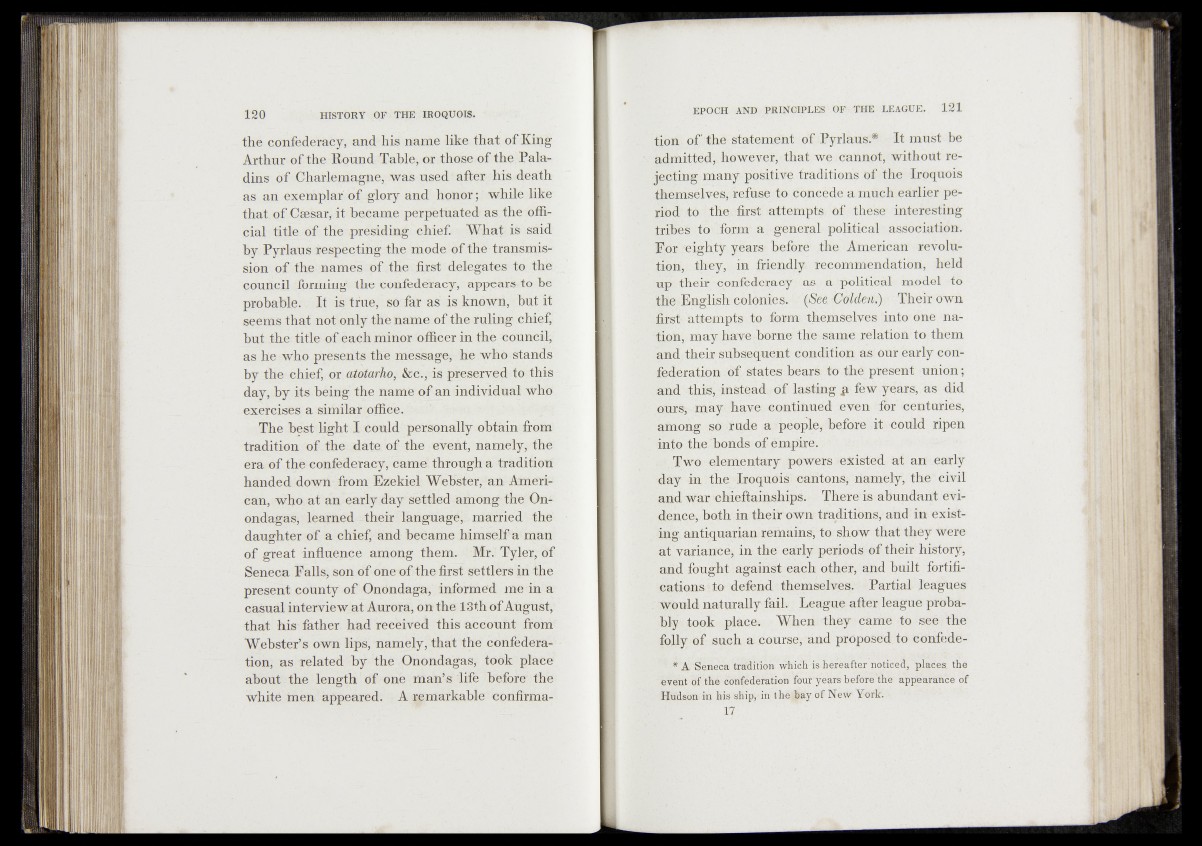
the confederacy, and his name like that of'King
Arthur of the Round Table, or tboseof the Paladins
of Charlemagne,' was used after his .death
as an exemplar of glory and honor; while like
that of Caesar, it became perpetuated' as the official
title, of the .presiding chief. What is said
by Pyrlaus respecting the mode of the transmission
of the names of tthe first delegates to the
council 'forming the confederacy, af>pe»rs*to be
probable. It is true, SO' far as is known, but it
seems that not only the name .of the ruling- chief,
but the title of each minor officer in the bepncil,
as he Who presents’ the message,- he who stands
by the chief, or atotarho, &c.,a& preserved to this
day, by its being the name of an individual who
exercises a similar office.
The best light I could personally obtain from
tradition of the ~ date, of the event, namely, the
era of the confederacy, came through a traditip'n
handed down from Ezekiel Webster, an American,
wfio at an early day settled among the: On-
ondagas* learned their language,kmarried, the
daughter of a chief, and became himselfa m'an
of great influence among them. Mr. Tyler, of
Seneca Palls, son of one of-the. first settlors in the
present county uf Onondaga, informed me in a
caSuatinterviewat Aurora, on thelSthof August,
that his- father had received this account from
Webster’s own lips, namely, that the confederation,
as related by the Onondagas, took place5
about the length df one man’s life before the
white men appeared. A remarkable confirmst|
on of the statement of Pyrlaus.* It must be
admitted, however, that we,cannot, without rejecting
many positive traditions df the Iroquois
themselves/, refuse to concede a much earlier period
to the first attempts, b£L these interesting
tribes to form" a rgeneral political association.
Tor eighty years* before- the American revolution,
they, in friendly recommendation, held
up their’'confederacy| as a political model to
the English celênies*.-' {ijéq *Pëldetx^$ Their own
first .'attempt^ to form themselves ’into one nation,
may have home the same relation to them
and their subaequeht Condition as-our early confederation.
.of; statesibears to thé present union;
and -thiSj^hfetpad; of lasting g few years, as did
ours, may have continued even ’ for’ centuries,
among so rude a 'people*'before -it could ripen
into the bonds of émpire.
Two elementary powers tèadsted at an early
day in the; Iroquóis cantons, namely, thé* civil
and war chieftainships. There is abundant, evidence,
both in their own traditions,* and in existing
antiquarian remains, to show that thèy Were
at variance, in the early periods of their history,
and fought lagainst each other, and built fortifications
to defend themselves,. Partial .leagues
. wöuld naturally fail. League after league probably
took place. When they came to see the
fifily of such a course, and proposed to confede-
* A Seneca tradition wWpris Eereafter noticed, placea the
event of .the confederation four years before th.e 'appearance of
. tjxidsóndn his-ship/dnHhe0ay of New York.
IM S